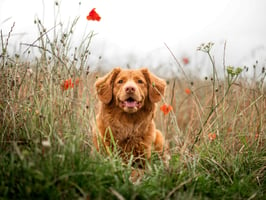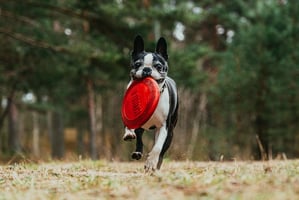Hip dysplasia is a common orthopedic condition in dogs. Dog insurance that covers hip dysplasia can...
How to Handle a Dog That Is Reactive to Other Dogs
Dogs that are reactive to other dogs can be a challenge to manage, but with the right strategies, it is possible to ensure that your dog is comfortable and safe in social situations. This article will provide an overview of the most common strategies for dealing with a dog that is reactive to other dogs, including desensitisation, counter-conditioning, and management.
What Causes Dogs to be Reactive to Other Dogs?
Dogs can become reactive to other dogs for a variety of reasons, including fear, anxiety, or a lack of socialisation. If your dog is exhibiting reactive behaviour, it is important to understand the underlying cause before attempting any behaviour modification techniques.
In some cases, the cause of a dog's reactivity can be traced back to a traumatic experience, such as being attacked by another dog. In other cases, the cause may be more subtle, such as a lack of socialisation or even an underlying medical condition.
It is important to note that reactive behaviour can also be caused by an underlying medical issue, such as an ear infection or a thyroid disorder. If you suspect that your dog's reactivity might be related to a medical issue, it is important to consult with your veterinarian to rule out any underlying medical conditions.
Desensitisation
Desensitisation is a behaviour modification technique that involves gradually introducing your dog to a situation or stimulus that causes them to become reactive. This technique is often used to help dogs become less reactive to other dogs.
When using desensitisation, it is important to gradually introduce your dog to the situation or stimulus in a controlled environment. Start by exposing your dog to the stimulus at a low level and then gradually increase the intensity of the stimulus. This will help your dog become accustomed to the stimulus and eventually become less reactive.
It is also important to reward your dog for calm behaviour when they are exposed to the stimulus. This will help them to associate the stimulus with a positive experience.
Counter-Conditioning
Counter-conditioning is another behaviour modification technique that involves teaching your dog to associate a stimulus with a positive experience. This technique is often used to help dogs become less reactive to other dogs.
When using counter-conditioning, it is important to reward your dog for calm behaviour when they are exposed to the stimulus. For example, if your dog is reactive to other dogs, you can reward them with treats when they remain calm when another dog is nearby. Over time, your dog will learn to associate the stimulus with a positive experience.
Management
Management is a technique that involves controlling the environment to reduce the chances of your dog becoming reactive. This technique is often used in conjunction with desensitisation and counter-conditioning.
When using management, it is important to create an environment that is free from triggers that may cause your dog to become reactive. This may involve avoiding certain areas, such as dog parks, or using a muzzle or other management tools when in public.
It is also important to create an environment that is safe and comfortable for your dog. This may involve providing them with a safe place to retreat to when they become overwhelmed or providing them with toys and other activities that can help to keep them occupied and distracted.
Conclusion
Dogs that are reactive to other dogs can be a challenge to manage, but with the right strategies, it is possible to ensure that your dog is comfortable and safe in social situations. Desensitisation, counter-conditioning, and management are all effective techniques for helping dogs become less reactive to other dogs.
It is important to remember that every dog is different, and each dog will respond differently to different techniques. It is important to consult with a professional if you are unsure of how to best manage your dog's reactivity.



